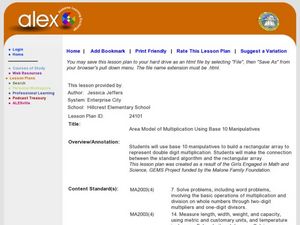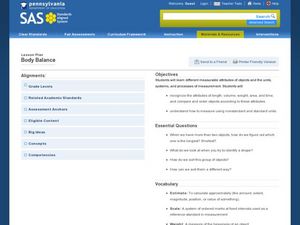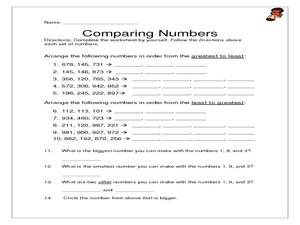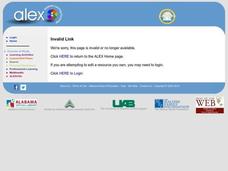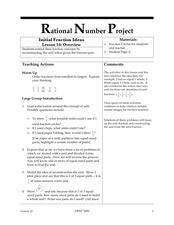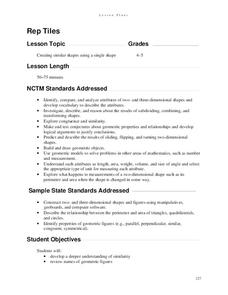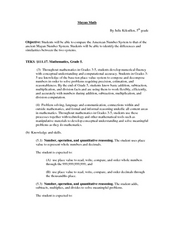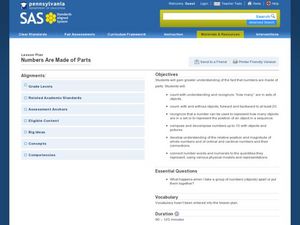Curated OER
Relating Fractions and Decimals
Sixth graders identify how fractions and decimals both illustrate parts of a whole. They estimate which number is greater by comparing them to the given fraction and use greater than or less than symbols for each.
Curated OER
Introduction to Equivalent Fractions
Explore equivalent fractions! Youngters measure the crown of their head with adding tape labeled with various fractions and fractional parts, and compare strips to notice numerical relationships. They fold adding tape in half and color...
Curated OER
Smiling at Two Digit Multiplication!
How do I solve a two-digit multiplication problem? Your class tackles this question by walking through problem solving methods. They first investigates and applies traditional multiplication methods, and they then compare those with...
Curated OER
Exploring Equivalent Fractions
An extensive lesson explores equivalent fractions and is intended for three 60-minute periods. Young mathematicians compare and order fractions with like and unlike denominators. Included are worksheets, assessments, and answer sheets;...
Curated OER
Area Model of Multiplication Using Base 10 Manipulatives
Explore two-digit multiplication with your class as they work in groups to build models of two-digit multiplication using base 10 manipulatives. They construct rectangles replacing standard numbers with equivalent place values using the...
Curated OER
Fraction Circles
Fourth graders receive a fraction circle and show how each different part makes a whole. Students compare the different fractions that make up a whole. Students choose 2 fractions which are inside a bucket and they compare them both...
Curated OER
Comparing/Ordering Numbers
Third graders compare numbers. In this math lesson plan students compare ones, tens, and hundreds. They also order numbers from least to greatest and from greatest to least.
Curated OER
Body Balance
Examine measurable characteristics of objects to build an understanding of the different ways you can discuss an object's size when comparing it to other objects. After whole group instruction, the class compares and organizes several...
Curated OER
Burger King Investigation
Students study data on the nutritional value of Burger King meals in order to discover its nutritional value and also to compare the meals, using mathematical computation, to the recommended daily diet. In this data handling lesson,...
Curated OER
Arranging Numbers in order up to 1,000
Third graders arrange numbers up to 1,000. For this arranging numbers lesson, 3rd graders play a game to try and build the biggest number they can using number tiles. Students work in groups to draw number tiles from a jar and arrange...
Curated OER
Equivalent Fraction Paper Strips
Young learners compare the relative values of fractions by making physical representations. They fold and label strips of paper that are equal in length to represent "one whole" and the equal parts that fractions represent. Also, they...
Alabama Learning Exchange
Understanding Fractions
Young learners explore fractions and demonstrate parts of a whole by using a candy bar and a piece of paper and dividing both into equal parts. Included is a worksheet that requires youngsters to color in half of each polygon shape. Some...
Curated OER
Fraction City
Welcome to Fraction City! This is an incredibly interactive and fun way to teach properties of fractions, and reaches multiple learning styles. Scholars create "blocks" by folding strips of paper in various increments (thirds, fourths,...
Curated OER
Initial Fraction Ideas Lesson 16: Overview
Kids will compare creating fractions from pieces of paper to chips. They begin with a fractional part and work back to a whole. Then order fractions from smallest to largest. They also complete a worksheet to find the missing pieces to...
Armory Center for the Arts
Place Value Collage
How can art represent math? Use a lesson on place value collages to illustrate the different meanings that numbers have in their designated places. Kids observe photographs and paintings that show place value, then work on their own.
Illustrative Mathematics
Measure Me!
How many unifix cubes tall are you? If you're not sure, then perform this math activity with your class and find out. Working in pairs, young mathematicians make measuring sticks out of unifix cubes in order to determine the length of...
Alabama Learning Exchange
The World of Integers
Review operations related to rational numbers and integers using the include PowerPoint presentation, "Interesting Integers." Young mathematicians classify rational numbers as being natural, whole, or integers and read an article about...
Improving Measurement and Geometry in Elementary Schools
Rep Tiles
In addition to the catchy title, this lesson plan provides upper graders an opportunity to more closely scrutinize the attributes of plane figures. In particular, they focus on the similarity of different shapes. Both whole-class and...
Institute of Electrical and Electronics Engineers
Exploring at the Nanoscale
Nano-nano! Nanotechnology can seem like it's from another planet! After learning about this tiny technology, collaborative groups experiment with how smaller particles affect chemical reactions. They do this by immersing a whole and a...
Curated OER
Number and Operations: Webbing Our Way Through Numbers
Second graders explore estimation and place value. In this place value lesson, 2nd graders estimate and construct numbers while working with spider activities. Students use addition and subtraction to compare estimates. Resources and...
Curated OER
Mayan Math
Fifth graders investigate the Maya's as mathematicians. In this Mayan math lessons, 5th graders work with the ancient Mayan numbering system by comparing it to the American Number System. They tell the differences and similarities...
Curated OER
The Math Of African Music
Students practice rhythms and fractions on African drums in this Music lesson mixing Math skills and music notation. The lesson also includes ideas for assessment and state and national benchmarks met.
Pennsylvania Department of Education
Numbers Are Made of Parts
Children play with barnyard animal cards to practice composing and decomposing numbers. With their "secret number" of animal cards in a cup, they shake and spill them onto a barn story board, counting how many animals fall in the barn...
Curated OER
Telling Time as an Everyday Use of Numbers
How can we estimate time? Have your young mathematicians make a clock. Then they compare and contrast types of clocks. They practice writing times in two different ways and make a book about telling time.






